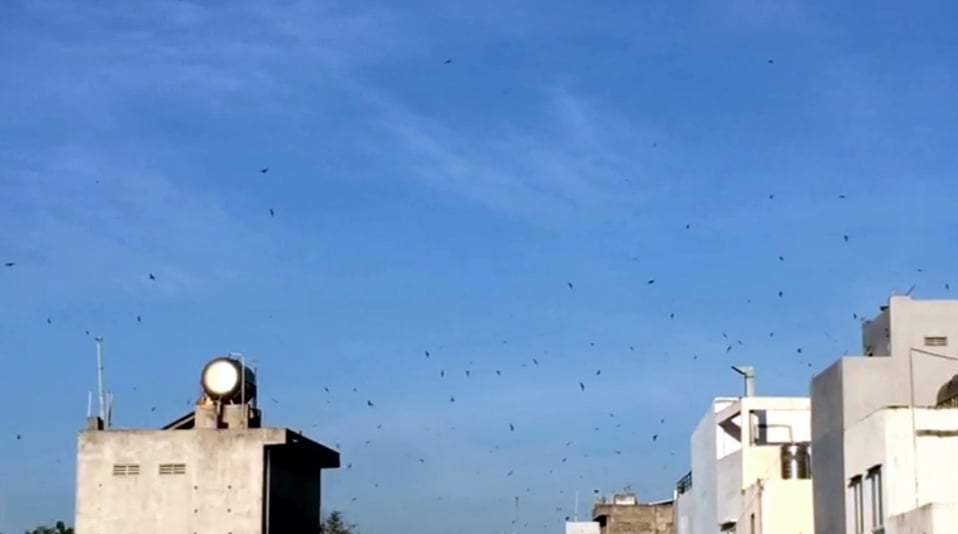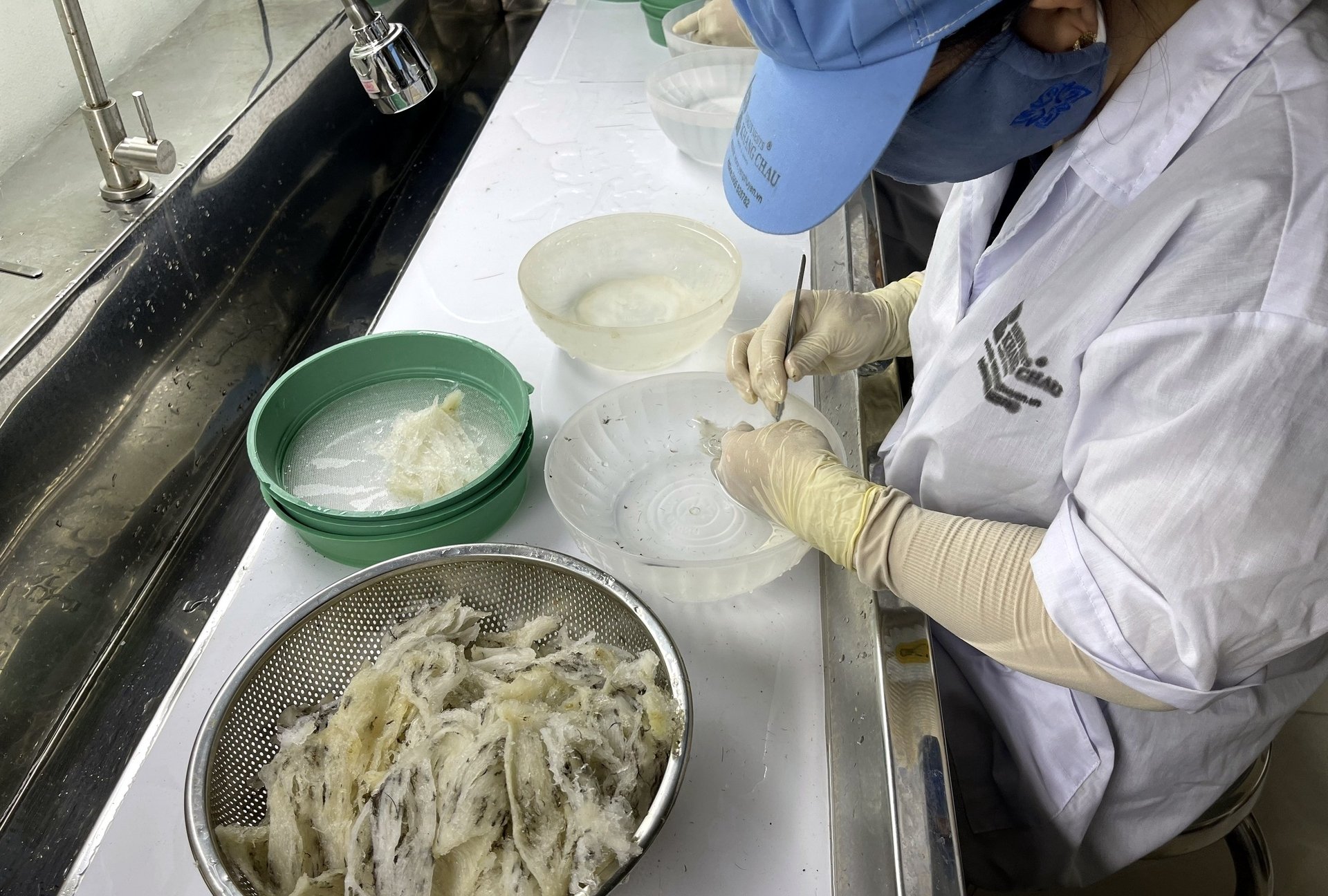June 20, 2025 | 21:34 GMT +7
June 20, 2025 | 21:34 GMT +7
Hotline: 0913.378.918
June 20, 2025 | 21:34 GMT +7
Hotline: 0913.378.918

Phu Yen province currently possesses significant potential for the development of the swiftlet farming industry. Photo: KS.
Phu Yen province is a favorable regions for the sustainable development of swiftlet farming. This advantage is the result of a high average temperature, suitable humidity levels, and a coastline stretching nearly 200 kilometers, along with vast plains providing an abundant source of flying insects, which are the preferred food of swiftlets.
Phu Yen province has prioritized the development of swiftlet farming and formulated a swiftlet farming area plan since 2015. Additionally, the Provincial Swiftlet Association was established to support swiftlet farmers in complying with government regulations, providing technical guidance, and ensuring efficient breeding and management of swiftlet flocks. These conditions have subsequently contributed to the local swiftlet farming development.
According to Phu Yen province's agricultural sector, there are currently over 931 active swiftlet houses throughout the province. The Provincial Swiftlet Association estimates that the province produces an approximately 2 tons of swiftlet nests every year. Accordingly, income generated from swiftlet farming has helped many local residents escape poverty and improve their livelihoods since 2015.
Mr. Nguyen Van Lam, Director of Phu Yen province's Sub-Department of Livestock Production and Animal Health, stated that the province will strengthen its management efforts to ensure the sustainable development of swiftlet farming. Namely, the province will adhere to the swiftlet house development plan, as well as implement the registration and issuance of identification codes for swiftlet houses in compliance with regulations.
Additionally, the province will continue to enforce temporary regulations regarding swiftlet farming management within the province as per Decision No. 2399 dated December 25, 2018, issued by the Provincial People's Committee. The Decision focused on environmental protection, veterinary hygiene, and encouraging swiftlet farmers to engage in post-harvest processing and develop product supply chains for swiftlet nests.
"We will implement the issuance of identification codes for swiftlet houses, manage swiftlet houses through information technology, establish product supply chains, and facilitate exports with origin traceability. Furthermore, we will cooperate with the Provincial Swiftlet Association and local governments to organize awareness campaigns and encourage local residents to refrain from illegal hunting of swiftlets. Additionally, we will implement penalties to enforce the law as prescribed," added Mr. Nguyen Van Lam.
Phu Yen province issued Document No. 4795 on September 12, 2023 to reinforce the implementation of measures to prevent illegal hunting, manage swiftlet farming, and promote the export of swiftlet nest products.

A closer look at swiftlets building their nests. Photo: KS.
According to Mr. Pham Duy Khiem, Chairman of the Phu Yen Provincial Swiftlet Association and Vice Chairman of the Vietnam Swiftlet Association, the monitoring of swiftlet houses revealed that their populations have increased within the last few months. Several swiftlet houses have seen their populations expanded by 10 to 30% in a short period of time. Most notably, multiple swiftlet houses have reported a full house of swiftlets and nests despite being in operation for only six to seven years.
This positive development can be attributed to the unwavering commitment of the Government, which has consistently issued directives and communications to guide local governments in their concerted efforts to safeguard swiftlets and take stringent measures against deliberate actions that harm swiftlet populations and local wildlife.
Public awareness has also grown, leading to a widespread understanding that the trapping and confining of swiftlets in cages is ethically and morally problematic. The community has expressed strong condemnation against such practices. Consequently, these developments are encouraging for the sustainable expansion of swiftlet populations and nesting activities in Phu Yen province, as well as all 43 provinces and cities engaged in swiftlet farming nationwide.
Moreover, Phu Yen province has effectively sustained its Swiftlet Protection Committee under the Phu Yen Provincial Swiftlet Association. This committee has provided proactive support to various governmental departments and agencies in their endeavors to monitor the preservation of swiftlet populations, particularly against the illegal trapping of these avian species. As a result, Phu Yen province is expected to achieve a swiftlet nest harvest exceeding 3 tons by the end of 2023.
In preparation for swiftlet nest exports, Mr. Pham Duy Khiem highlighted that the Provincial Swiftlet Association has compiled a comprehensive roster of its members. These records encompass vital data, including land areas, production figures, harvesting activities, and the overall condition of swiftlet nests. This valuable information has been conveyed to the local Department of Livestock Production and Animal Health. The purpose of this information exchange is to facilitate the identification of swiftlet houses seeking participation in the supply chain for export and to ensure their strict compliance with regulations.
Additionally, the Provincial Swiftlet Association has taken proactive measures by organizing specialized training sessions and workshops. These initiatives focus on promoting essential technical knowledge related to the care and maintenance of swiftlet houses. The ultimate goal is to guarantee that the swiftlet nests produced adhere to the strict export requirements.

The processing of swiftlet nests at Khang Chau Swiftlet Nest Co., Ltd. Photo: KS.
As a long-established business with eight swiftlet nests and a significant swiftlet nest output in Phu Yen province, currently supplying various provinces and cities throughout the country, Ms. Tran Bao Chau, Director of Khang Chau Swiftlet Nest Co., Ltd., stated that the company consistently updates its technologies and places a strong emphasis on ensuring food safety and hygiene to enhance the quality of swiftlet nests.
Thanks to these efforts, the company's swiftlet nest products have achieved numerous certifications, including a 4-star OCOP certification, HACCP, and ISO. Additionally, three of the company's swiftlet houses have met the volume requirement to participate in the supply chain of raw materials for export.
"We harvest swiftlet nests from our swiftlet houses and process them according to export standards to cater to various markets. The company adheres to the regulations and standards for exported swiftlet nest products. Namely, we conduct regular monthly checks, and promptly make adjustments to correct discrepancies," shared Ms. Tran Bao Chau.
Furthermore, Ms. Chau added that the company aspires to expand the reach of Khang Chau swiftlet nest products to a broader customer base. Consequently, the company's strategy consistently places product quality at the forefront of its priorities.
Translated by Nguyen Hai Long
/2025/06/17/3942-2-143243_548.jpg)
(VAN) Recently, in Sweden, the Secretary of the Binh Dinh Provincial Party Committee presented the Investment Registration Certificate for the 'Polyester Fabric Recycling Complex' project to SYRE Impact-AB Company.
/2025/06/12/3721-2-202745_83.jpg)
(VAN) TH made an impression at Seoul Food 2025 with its line of natural beverages, paving the way for Vietnamese food products to enter the South Korean market.

(VAN) Soc Trang's success in rice exports stems from a strategy of developing fragrant and specialty rice cultivation areas and standardizing production toward low-emission practices.
/2025/06/11/1311-5-120811_839.jpg)
(VAN) The pig farming industry is facing the challenge of comprehensive restructuring to meet requirements for quality, safety, traceability, and market expansion both domestically and for export.

(VAN) Vietnam considers participating in ALGROALBA in order to expand agricultural production, coordinate the assessment and effective exploitation potential land.
/2025/06/05/5314-1-184727_407.jpg)
(VAN) From seemingly worthless fish scales and skin, enzymes and lactic ferments can transform by-products into peptides, opening a sustainable, effective business direction and elevating Vietnamese seafood.

(VAN) TTC AgriS and IFC signed a strategic partnership to develop a sustainable agricultural value chain, aiming to achieve the Net Zero target by 2035.